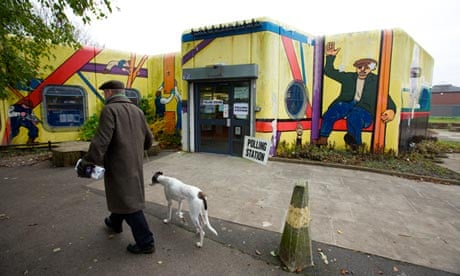Lack of information, last-minute legislation and Home Office inexperience all contributed to the first police commissioner elections recording the lowest turnout in peacetime, the official inquest into the polls has concluded.
The Electoral Commission report into the £100m police and crime commissioner elections says that only one in five people had enough information to make an informed decision about whom to vote for as their police watchdog.
Just 15.1% of registered voters took part in the elections held across England and Wales for all police force areas outside of London. The elections watchdog said this was the lowest recorded level of participation at a peacetime non-local-government election in Britain.
The official report to the home secretary, Theresa May, concludes that the government wrongly assumed that "simply holding" an election was enough on its own to inspire participation and says that significant changes need to be made before they are held again in three years' time.
The commission found that the most common reason for not voting was lack of awareness about the polls (37%) with over a quarter (28%) of people saying they knew "nothing at all" and 48% "not very much" about what the policing elections were about. More than half (55%) said they found it difficult to access information about the candidates standing in their area.
Jenny Watson, the Electoral Commission chair, said: "It's not enough to think that simply holding an election will inspire participation. That's why at the 2016 PCC elections a candidate information booklet will be sent to every household."
The Home Office decided against sending information about the candidates to every household on cost grounds and instead set up a central website containing details about the candidates. More than 122,000 people took up the option of ordering a printed booklet in preference to using the website.
The official inquiry also found that key pieces of legislation were finalised too close to polling day. An order specifying a bilingual ballot paper for use in Wales only came into force 14 days before the election, leading to English-only ballot papers being destroyed at a £135,000 cost to the taxpayer. Detailed guidance on funding from the Home Office for the elections arrived only four days before polling day.
The report says the Home Office needs to set out by May 2014 how it will manage changes to the PCC election legislation well ahead of the next set of polls in 2016. It adds that in future the Home Office needs to consult the Cabinet Office and other parts of government that have more experience of running elections.
The Electoral Commission also carried out a survey of candidates who stood in the elections, which showed that nearly half said it was difficult to get the 100 signatures they needed to be nominated and two-fifths said they found it difficult to raise the £5,000 deposit. Parliamentary candidates need only 10 signatures and a £500 deposit.
Watson said: "Elections are the cornerstone of our democracy. It's vital that the rules surrounding them are clear. The rules for these elections were confirmed unacceptably late causing confusion for candidates and electoral administrators. The Home Office doesn't have experience in preparing for elections and they need to be better supported in future by parts of government that do."

Comments (…)
Sign in or create your Guardian account to join the discussion